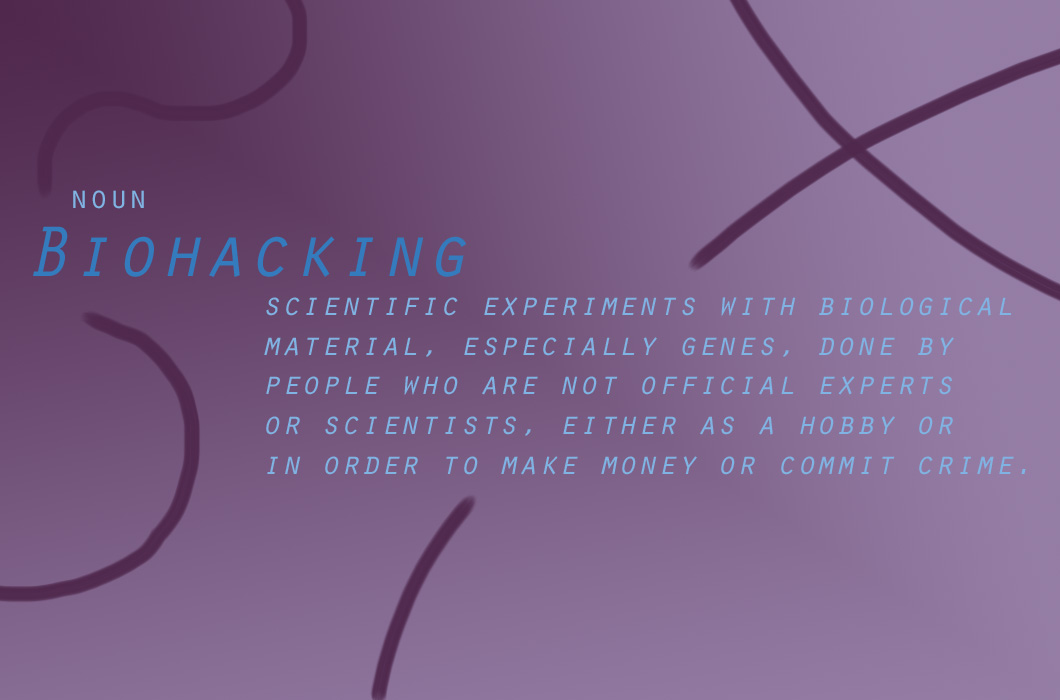[Written by Vaiva Gikaité]
[Image by Aike Jansen]
“Biohacking” might sound like science fiction, but lots of people are already doing it to some degree. It’s arguably even becoming necessary to in order to keep up with the pace of modern life.
But what even is it? Biohacking is the practice of manipulating your own body to improve its function in some way. It’s applied science without the regulation (and relative safety) of a lab environment and ethics committees. It ranges from simple practices like meditating to reduce stress to more extreme modifications, like implanting an RFID tag into your hand to eliminate the need to remember your house keys.
Biohacking involves inventing new integrated technologies and responding to the world of technology that already exists around us. There’s something about the former that is more uncomfortable than the latter. The difference is between working with what you already have and trying to surpass your natural limits to become more than human. But, of course, we already do that with cars and glasses and smartphones and everything we’ve ever invented.
That discomfort, or even fear, has come with every new wave of technology. When the invention of the printing press gave birth to mass media in the 19th century, there were accompanying fears that the unprecedented ease of access to information would overwhelm the population. Although these fears seem a tad overblown to us – we are acclimatised to newspapers as a part of everyday life – they aren’t unfounded. We didn’t evolve to cope with the intensity of the world we’ve made. Imagine how stressed out the Victorians would have been by the 24 hour news cycle and Twitter (actually, probably only slightly more than how stressed we are).
There is an insane amount of research that has been done to try and figure out how humans function, presumably so that we can use that knowledge to improve our quality of life and facilitate the achievement of whatever goals we set for ourselves. Here’s an example: we know that we need to exercise to maintain our health, but sometimes it doesn’t feel like there are enough hours in the day to set aside time for running on a treadmill instead of getting on with work. What if you could engineer your workout so that you burn more energy in a shorter amount of time? High intensity interval training (HIIT) could be considered a form of biohacking, because it was developed using the knowledge we have of how our bodies fuel our workouts at different intensities of training. All of a sudden you can spend less time in the gym to see good results. More recently, exercise machines equipped with infrared technology, which purportedly boosts the efficiency of workouts, have become popular among biohacking enthusiasts.
It can be an easy concept to get carried away with. If you can optimise one aspect of your life, why not try to make everything super efficient? You would quickly find yourself completely giving up sugar, all processed foods, alcohol, and social media; taking dozens of pills a day; and rejecting attachments to places and people. This is the approach that some billionaires are taking, and it reeks of a God-complex. Maybe you would be in perfect health and closer to living forever than the rest of us, but you would also be detached from what it means to be imperfectly human.
But maybe that’s exactly what we are trying to achieve with our constant drive for progress. We want to cure every disease and fix every problem – sounds like a quest for immortality. Biohacking may be a step towards achieving that but, as with any innovation, it will come with a cost – our species’ ego has already led to exploitation of others and the destruction of the environment.
If the idea of biohacking makes you feel uneasy – good. It should.
[Image Description: A purple background with purple stripes, onto which is placed the following text in blue letters: Noun. Biohacking: scientific experiments with biological material, especially genes, done by people who are not official experts or scientists, either as a hobby or in order to make money or commit crime.]

